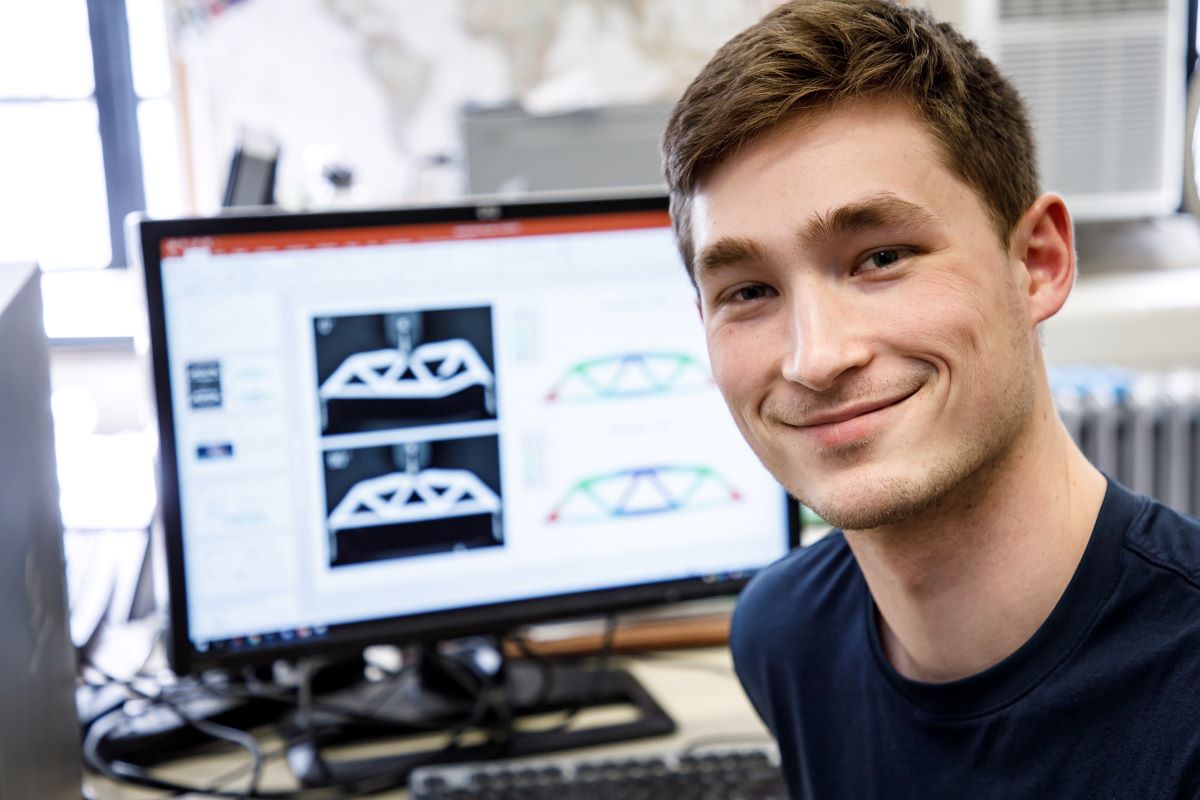 Bailey Brown ’18 recently returned to campus after completing a 6-month graduate internship in Product Research and Development (PR&D) at Align Technology’s office in Morrisville, NC (near Raleigh/Durham). Align Technology focuses on orthodontic technologies, specifically Invisalign clear teeth aligners and Itero scanners. Brown is a PhD student in mechanical engineering, working in Professor Natasha Vermaak’s research group on tailoring topology optimization frameworks for specific additive manufacturing technologies. As a Lehigh undergraduate studying mechanical engineering, Brown received the 2018 Andrew Wilson Knecht III Memorial Award, which recognizes the senior with the greatest potential for applying technical training to practical application.
Bailey Brown ’18 recently returned to campus after completing a 6-month graduate internship in Product Research and Development (PR&D) at Align Technology’s office in Morrisville, NC (near Raleigh/Durham). Align Technology focuses on orthodontic technologies, specifically Invisalign clear teeth aligners and Itero scanners. Brown is a PhD student in mechanical engineering, working in Professor Natasha Vermaak’s research group on tailoring topology optimization frameworks for specific additive manufacturing technologies. As a Lehigh undergraduate studying mechanical engineering, Brown received the 2018 Andrew Wilson Knecht III Memorial Award, which recognizes the senior with the greatest potential for applying technical training to practical application.
Below is an interview between Brown and his advisor, Prof. Vermaak:
Can you share in general terms, what you worked on during your graduate internship?
Within the Product Research and Development team, I was in the Simulation and Modeling group. My main project was working on simulations using Finite Element Analysis (FEA) software, specifically ABAQUS combined with python scripting, in order to predict how teeth will move.
What aspects of the internship did you find particularly interesting or challenging?
Prior to this internship, I did not have any experience in biomechanics or orthodontics. Additionally, much of the work that I have done for my doctoral research has been more theoretical in nature than directly applications based. I found learning about orthodontic science from a mechanical engineering perspective very interesting, and it was rewarding to work on a project that had a concrete, practical application and could potentially contribute directly to real treatments that patients will receive. Another challenge was learning some of the company/industry specific concepts like certain software and terminology (for example, orthodontics-related terminology like “mesialization of the posterior teeth”).
How does working in an industry setting compare to the work you are doing as a graduate student?
Many of the technical skills—coding, FEA, science communication—that I have gained during my time as a graduate student so far were critical to the job I was doing as an intern at Align Technology. In that sense, the tasks I was responsible for were fairly similar to the tasks I do on a regular basis as a graduate student. I also found that the industrial setting I experienced does have a slightly different flavor than the academic setting. For example, the scope of the work tends to be narrower and more focused on details of larger projects that are worked on by a lot of people. In contrast, while collaboration with others is still critical as a PhD student, you are more responsible for the big picture of your own work.
Was there anything that was surprising or unexpected?
One thing that I was surprised by was how supportive the environment was. I expected that in an industry setting, there would be more expectation of figuring things out on one’s own, but instead I found that there was frequent collaboration and support within and across groups inside of the PR&D team.
What recommendations do you have for other students considering taking part in an internship experience while pursuing a PhD?
I would definitely recommend that other PhD students consider pursuing an internship if they have the opportunity. It was a good change of pace from what I had been working on in my own research, and I feel much more prepared and confident in my ability to finish my PhD and pursue a career upon graduation. I also feel that I made a lot of good connections with the people there and greatly enjoyed my time at Align Technology. To be successful, I would recommend always taking a lot of notes during meetings and staying organized (especially early in the internship/during the orientation period) as there is a lot of new information that can be overwhelming at times. Time management is also very important, and something that I feel I got a lot better at as the internship progressed. Most importantly, I would suggest making the most of the internship—learn as much as possible, take part in events, and enjoy the process! Finally, I would also like to thank the MechE department for their flexibility and support to make this experience possible on short notice!
A final note from Prof. Vermaak: Graduate internships enhance students' professional skills and their professional networks, as well as prepare them for a wide array of academic and non-academic career paths. In addition to deepening preparation in technical areas of expertise, internships may offer experience working in collaborative teams with diverse individuals, opportunities to improve communication skills, and chances to learn about innovation and entrepreneurship, leadership and management, as well as policy and outreach. These internships also provide greater exposure to use-inspired research, where a practical need or problem is a guide to identifying important fundamental questions. Increasingly, the importance of expanding the professional development of graduate students through experiential learning in internships at federal facilities, national laboratories, and industrial partners is being recognized. For example, Lehigh University recently hosted a National Workshop Series on the Role of Industry-University Partnership in Doctoral Education, and offers the innovative Pasteur PhD Partners (P3) Fellowship to provide graduate training more closely aligned with solving real-world industry problems. The National Science Foundation (NSF) has long supported the NSF Graduate Research Internship Program (GRIP) and recently introduced Supplements for Non-Academic Research Internships for Graduate Students (INTERN). Check out these and other resources for more information and opportunities!
